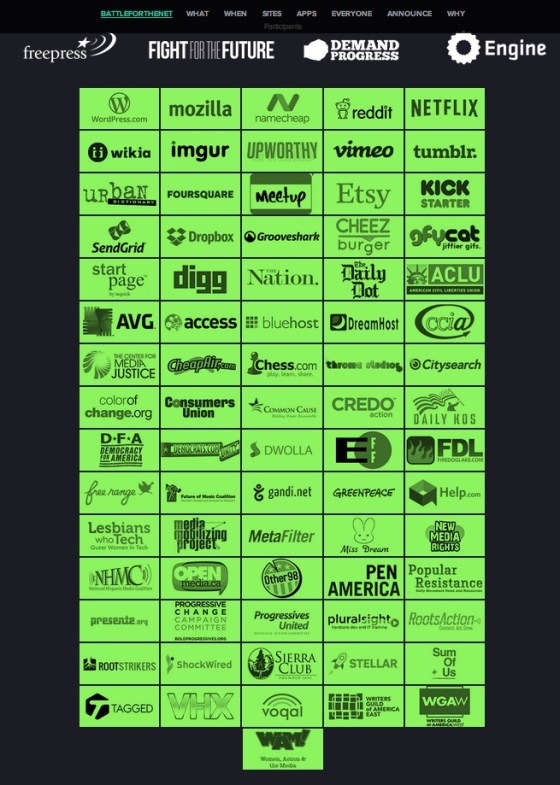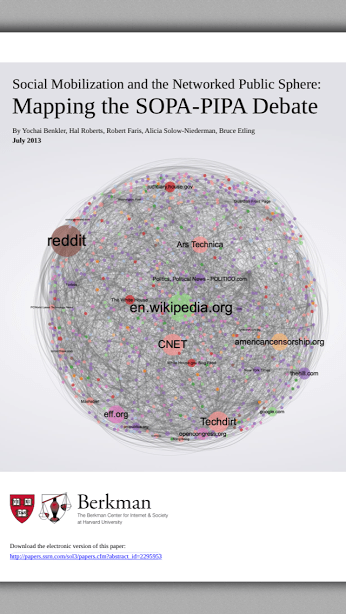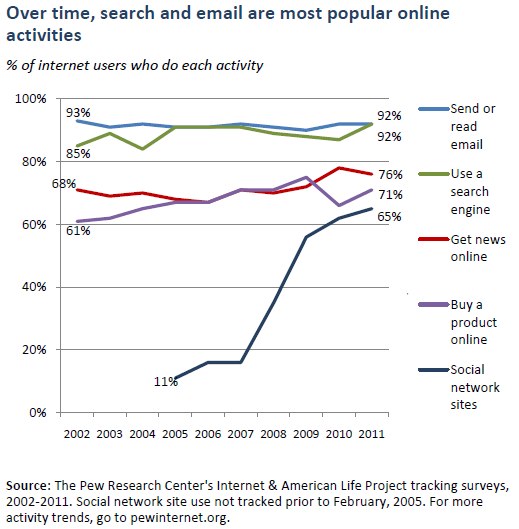Today, dozens of websites “slowed down” for a cause, collectively advocating against Open Internet rules proposed by the Federal Communications Commission. None of the participants in today’s “Internet Slowdown Day” actually delayed access to their websites: instead, they used code to add a layer to visitors’ Web browsers with one of the loading icons grimly familiar to anyone who’s ever waited for a long download or crufty operating system function to finish in an overlay and linked to BattleForThenet.com/September10, which encouraged visitors to sign a letter supporting net neutrality, or to use online tools to call Congress.
While many big tech companies didn’t participate, millions of visitors to Reddit, Tumblr, Netflix, Free Press, Reddit, Netflix, Mozilla, Kickstarter, Upworthy, Automattic, Digg, Vimeo, Boing Boing, Urban Dictionary, Foursquare, Cheezburger and the Sunlight Foundation saw the spinning icon, among others.
The effort appears to have made a difference: According to the FCC*, by 6 PM ET the agency saw 111,449 new public comments added to the already record-setting total, with some 41,173 filed into the 14-28 docket of the FCC’s website since and another 70,286 sent to the openinternet@fcc.gov inbox, setting a new high water mark of some 1,515,144 to date, with more yet to come. As reported by Mike Masnick, citing ThinkProgress, the Internet slowdown generated 1000 calls per minute to Congress. *Update: Fight for the Future claims that more than 740,000 comments were submitted through Battleforthenet.com and that the FCC hasn’t caught up. According to the nonprofit, “this happened during our last big push too when their site crashed. We are storing comments and will deliver all.”
“We sent 500K+ comments,” wrote Tiffaniy Cheng, co-founder of Fight for the Future, in an email. “They’re getting backlogged as the FCC can’t handle the amount of data. The FCC asked us to hold as they could not accept them and can’t handle all the load. So, they only just got to accepting them again.”
That means there have been at least 409,522 reply comments filed since July 18, with five days left in the reply comment period, with more than one quarter of them coming in a single day. (*If Fight for the Future’s total is correct, the number of reply comments filed passed 800,000, with the total nearing 2 million.) The FCC will host a public Open Internet roundtable discussion on September 16, the day after the period closes. According to an analysis of the first 800,000 public comments by the Sunlight Foundation, less than 1 percent of the submissions were clearly opposed to net neutrality.
These numbers are still dwarfed by the millions of calls and emails sent to Washington during the campaign to halt the Stop Online Piracy Act (SOPA) and PROTECT-IP Act in Congress in 2012, when Google and Wikipedia connected visitors to their websites to switchboards on Capitol Hill. They may also have less of an effect on an independent regulatory agency that has yet to chart a sustainable legal course in the storm of online criticism and intense lobbying by affected industries.
According to a FCC spokesman, the agency expected an increased volume of traffic due to the “slowdown.” Perhaps anticipating the interest, the @FCC’s first tweet today encouraged people to submit comments via email:
Next Monday 9/15 is the deadline for the 2nd round of #OpenInternet comments. Submit via openinternet@fcc.gov.
— The FCC (@FCC) September 10, 2014
The total number of comments on the Open Internet proceeding is sure to grow in the remaining week, with the number of emails sent to the FCC’s dedicated inbox likely to go past a million. (Update: On Thursday morning, the FCC confirmed that a total of 632,328 comments filed to ECFS and 1,118,107 sent to openinternet@fcc.gov, for a cumulative total of 1,750,435.) In many ways, that outcome feels appropriate.
When the FCC’s 18 year-old online commenting system has groaned under a huge volume of online traffic, people have routed around the downed comment system and used the original killer app of the Internet: email, the “tremendous, decentralized, open platform on which new, innovative things can and have been built,” based upon the same kinds of open protocols that enabled the unprecedented growth of a wealth of networks to grow around the world.
Update: At the end of the day after the Internet Slowdown, the FCC still working to enter all of the new comments created the day before into their systems — and the agency decided to offer another way to file comments: using email attachments.
In fact, FCC asked for something unexpected, simple and smart: for comments to be submitted at bulk open data, as .csv files of no more than 9 MB each. While the FCC doesn’t refer specifically to the comments that Fight for the Future has collected, this option does offer an easy way to electronically transfer the comments through an established channel. In the future, perhaps this will become the default option for
filing bulk comments collected by advocates, at least until Congress funds a new online filing system or the agency finds a way to use Dropbox. It should certainly make releasing them online as structured data for third-party analysis much easier; if the FCC wanted to, if could publish them almost as quickly as the comments came in.
The agency’s chief information officer, David Bray, explained the additional option in a blog post:
The volume of public feedback in the Open Internet proceeding has been commensurate with the importance of the effort to preserve a free and open Internet.
The Commission is working to ensure that all comments are processed and that we have a full accounting of the number received as soon as possible. Most important, all of these comments will be considered as part of the rulemaking process. While our system is catching up with the surge of public comments, we are providing a third avenue for submitting feedback on the Open Internet proceeding.
In the Commission’s embrace of Open Data and a commitment to openness and transparency throughout the Open Internet proceedings, the FCC is making available a Common Separated Values (CSV) file for bulk upload of comments given the exceptional public interest. All comments will be received and recorded through the same process we are applying for the openinternet@fcc.gov emails.
Attached is a link to the CSV file template along with instructions. Once completed, the CSV file can be emailed to openinternet@fcc.gov where if it matches the template the individual comments will be filed for the public record with the Electronic Comment Filing System. When you email this file, please use the subject “CSV”. We encourage CSV files of 9MB or less via email.
The Commission welcomes the record-setting level of public input in this proceeding, and we want to do everything we can to make sure all voices are heard and reflected in the public record.





